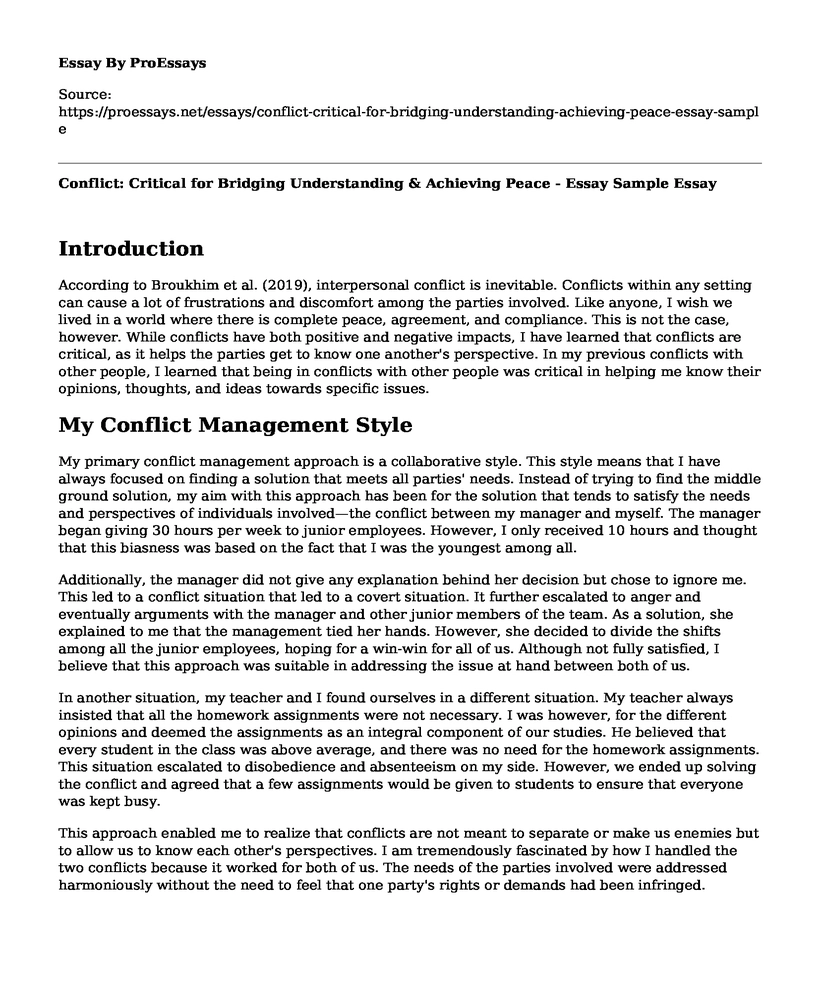Introduction
According to Broukhim et al. (2019), interpersonal conflict is inevitable. Conflicts within any setting can cause a lot of frustrations and discomfort among the parties involved. Like anyone, I wish we lived in a world where there is complete peace, agreement, and compliance. This is not the case, however. While conflicts have both positive and negative impacts, I have learned that conflicts are critical, as it helps the parties get to know one another's perspective. In my previous conflicts with other people, I learned that being in conflicts with other people was critical in helping me know their opinions, thoughts, and ideas towards specific issues.
My Conflict Management Style
My primary conflict management approach is a collaborative style. This style means that I have always focused on finding a solution that meets all parties' needs. Instead of trying to find the middle ground solution, my aim with this approach has been for the solution that tends to satisfy the needs and perspectives of individuals involved—the conflict between my manager and myself. The manager began giving 30 hours per week to junior employees. However, I only received 10 hours and thought that this biasness was based on the fact that I was the youngest among all.
Additionally, the manager did not give any explanation behind her decision but chose to ignore me. This led to a conflict situation that led to a covert situation. It further escalated to anger and eventually arguments with the manager and other junior members of the team. As a solution, she explained to me that the management tied her hands. However, she decided to divide the shifts among all the junior employees, hoping for a win-win for all of us. Although not fully satisfied, I believe that this approach was suitable in addressing the issue at hand between both of us.
In another situation, my teacher and I found ourselves in a different situation. My teacher always insisted that all the homework assignments were not necessary. I was however, for the different opinions and deemed the assignments as an integral component of our studies. He believed that every student in the class was above average, and there was no need for the homework assignments. This situation escalated to disobedience and absenteeism on my side. However, we ended up solving the conflict and agreed that a few assignments would be given to students to ensure that everyone was kept busy.
This approach enabled me to realize that conflicts are not meant to separate or make us enemies but to allow us to know each other's perspectives. I am tremendously fascinated by how I handled the two conflicts because it worked for both of us. The needs of the parties involved were addressed harmoniously without the need to feel that one party's rights or demands had been infringed.
Effects on the Relationship
Conflicts can have both positive and negative impacts on the parties involved (Raines, 2019). The conflicts made my relationships with the manager and the teacher stronger than before. I realized that the occurrence of the battle is always meant to improve the understanding of the parties involved in the opinions of each other. I was addressing the conflicts that I experienced enabled my manager and teacher to understand me better, and that all I wanted to be equal. It helped improve productivity in my workplace because we ended up forming a more cohesive workforce driven by the desire to achieve. It also reduced the costs based on the subsequent enhancement of the better business decisions that took place afterward. Additionally, my level of emotions, behavior, and communication transformed positively towards the manager, and this further allowed me to work towards the achievement of the organization's mission and vision.
Changes
I believe that my current conflict management is excellent and, therefore would make no changes. This reasoning is based on the fact that the collaborative style works to address the perspective of the parties involved.
Conclusion
Interpersonal conflict is inevitable, and the occurrence of disputes within any setting causes a lot of frustrations and discomfort among the parties involved. In all the conflict situations, I have always tended to apply this style to provide solutions.
References
Broukhim, M., Yuen, F., McDermott, H., Miller, K., Merrill, L., Kennedy, R., & Wilkes, M. (2019). Interprofessional conflict and conflict management in an educational setting. Medical teacher, 41(4), 408-416. https://www.tandfonline.com/doi/abs/10.1080/0142159X.2018.1480753
Raines, S. S. (2019). Conflict management for managers: Resolving workplace, client, and policy disputes. Rowman & Littlefield.
Cite this page
Conflict: Critical for Bridging Understanding & Achieving Peace - Essay Sample. (2023, Aug 09). Retrieved from https://proessays.net/essays/conflict-critical-for-bridging-understanding-achieving-peace-essay-sample
If you are the original author of this essay and no longer wish to have it published on the ProEssays website, please click below to request its removal:
- Application for Position of Customer Relations Advisor
- Spokesperson Career Paper Example
- Building the Nursing Profession Essay Example
- Essay Sample on Work-Related Stress: A Growing Threat to Employee Mental Health
- Essay Example on Walgreens: Overcoming Discrimination for a Better Workplace
- Essay Sample on 21st Century Businesses: Corporate Social Responsibility & Corporate Citizenship
- Job Control Unionism: Challenges & Advantages - Essay Sample







